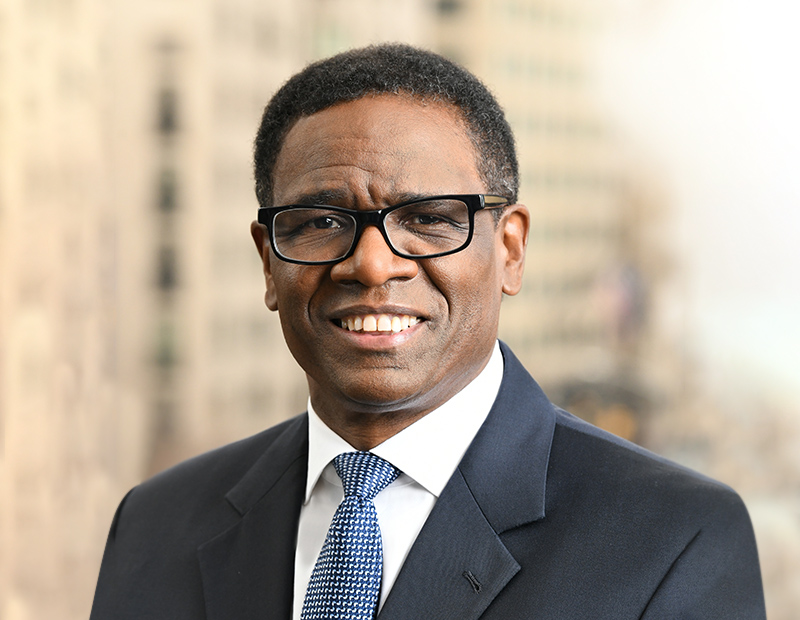Ken McIntyre on Extending CRE’s Talent Pipeline
The Real Estate Executive Council’s first CEO discusses commercial real estate’s journey toward greater inclusivity.
Earlier this year, the Real Estate Executive Council, a professional trade association for commercial real estate executives of color, tapped industry veteran Ken McIntyre as its first CEO. A longtime REEC board member, McIntyre has more than 25 years of experience in commercial real estate finance. He is the founder & managing principal of PassPort Real Estate LLC, a debt and equity advisory firm that also consults on diversity and inclusion. He has also held executive positions at MetLife’s Real Estate Investments Group and Hudson City Savings Bank, among others.
In this interview with Commercial Property Executive, McIntyre discusses how REEC and other organizations are helping increase diversity and inclusion within the commercial real estate industry.
Commercial real estate remains one of the least-diverse industries. What role are you, PassPort Real Estate and REEC playing in changing that?
I was approached by Project REAP (an educational diversity initiative for multicultural real estate professionals) and stepped in to be executive director in 2017. That was an assignment for PassPort Real Estate, even though it was also a full-time role. In 2018, I took on an assignment as an executive adviser to the chief of the office of diversity and inclusion at the Port Authority of New York and New Jersey.
I was later approached by REEC to be CEO of the organization, which I am now.
Last year, REEC’s board recognized two things. One is that although we have an industry that has challenges with diversity, there are still a significant number of people of color in the industry, and, increasingly they’re in executive-type roles. So, our organization is seeking to build stronger community and to support talent at all levels, including building a pipeline into the industry. The board asked me to lead REEC’s mission to focus on those types of initiatives.
READ ALSO: Real Estate Has a Diversity Problem
Those discussions happened during 2019, so this all predated what I call the news cycle of 2020—before the disproportionate effects of COVID-19 and the death of George Floyd. It wasn’t just the George Floyd case in Minnesota; that made the snowball much larger. The light was already being shone on the inequities across communities in the U.S. And then you throw in the injustice that some of those communities have been experiencing and you literally ended up with protests in the streets. Companies are reacting to that.
You were a longtime REEC board member before being tapped as CEO. What attracted you to the role?
The board and the organization started to recognize that there were more executives of color than we had outreach to with our limited staff. Aside from that, we had started an initiative with the REEX (Real Estate Exchange) summer program that had the ability to grow. We had strong partners there. We had an initiative on mentorship, having our executive members meet with younger talent, and we thought that was scalable. We had an initiative on beginning to get our membership ready to be on public boards, specifically commercial real estate, but also on other public and private boards. And we also thought that was an initiative that was scalable.
So, we just realized that we had grown beyond just holding a couple of meetings a year, to becoming an organization that had ongoing initiatives that need senior level management and staff. They asked me to step in to build that office. From our perspective, those initiatives all predate 2020 and now they are very timely and topical.
You also helped develop REEC’s REEX summer program for minority students. Tell us about that program and its importance.
Real estate is an industry that’s in a war for talent. We need to attract talent and so we need to expose that talent to the benefits of this industry earlier, before they start making decisions about where they want to go with their careers. The second part of that is we need to be accessing talent from as many different fishing ponds, if I can use that metaphor. If we’re not fishing in a pond of minorities, we’re not getting any talent there. We’re missing all of that.
We try to give them (the students) exposure to (commercial real estate) so they understand that these are opportunities that they may be able to pursue in the future. That’s what we’re trying to build out now. The summer program is not the end. It’s the beginning.
Project REAP issued a “call to action” for the C-suites of CRE firms and Fortune 500 companies, listing actions that can be implemented to integrate communities of color in commercial real estate. Do you see this moment as a true turning point for the industry in increasing minority representation?
Absolutely. At REEC, we put out a statement but we also discussed a framework for changing diversity in the industry, and our framework is focused on addressing the talent issues, which includes the pipeline and professional development of talent at all levels, including mentorships, sponsorships, promotion and all the way through to board representation.
Another dimension that we discussed is how companies spend their money. In the corporate world, this is called supplier diversity. So, are you spending your money with diverse firms? Are you supporting diverse entrepreneurs? If you’re investing your money, are you investing it with diverse firms or investing it in diverse communities or both, working with diverse firms to support diverse communities? The more intentionality around that, helping us be more effective.
The other thing we talk about within the framework of diversity is access to capital for minority entrepreneurs and for minority capital allocators. If you’re a firm that deploys capital—not just spends money but actually invests in deals—and works with partners, are you working with minority firms? If you’re a bank or a pension fund, how much of your capital is being controlled by minority entrepreneurs or investment managers?
The fourth point is intentionality about changing the culture in your organization to get to a point of inclusion … We want to work with companies to help them create environments where everybody can bring their whole self to the organization and not leave some part of themselves outside the office walls.
If you want to set goals or want help achieving them, then you can support REEC and REEC can be your partner. We have the talent pipeline so we can help you with talent. We have the ability to provide mentorship. We have a lot of companies that work across the country, so if you’re looking for vendors, suppliers, you can come through our membership and we can help you get to the target that you’re looking for. We have investment managers and developers that work across the country in all types of communities. If you want to allocate capital, we have companies that can do that for you.









You must be logged in to post a comment.